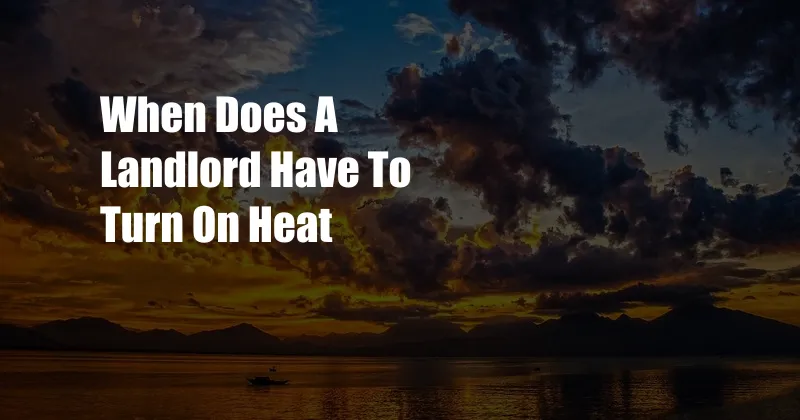
When Does a Landlord Have to Turn On Heat?
Imagine stepping into a bone-chilling apartment, your teeth chattering as you try desperately to warm your hands. This is a scenario many renters, especially those in colder climates, can relate to all too well.
The issue of when a landlord is required to provide heat to their tenants has been a subject of heated debate and conflicting laws. This article aims to shed light on the legal obligations of landlords regarding heat provision and empower tenants with essential knowledge to ensure their well-being during colder months.
Landlord’s Legal Obligations Regarding Heat
In most jurisdictions, landlords are legally responsible for providing habitable living conditions to their tenants. This includes maintaining a certain level of warmth within the rental unit, especially during the winter months. Laws vary from state to state, but generally, landlords must provide heat when the outdoor temperature falls below a specified threshold, typically between 65 to 68 degrees Fahrenheit.
Landlords are not only obligated to provide heat but must also maintain it at a reasonable level. This means ensuring the heating system is functional and capable of keeping the unit warm enough for tenants to live comfortably. If a tenant complains about insufficient heat, the landlord must promptly address the issue and make necessary repairs or adjustments.
Determining the Implied Warranty of Habitability
Even in the absence of specific laws or written agreements, landlords may still be held responsible for providing heat under the implied warranty of habitability. This legal doctrine implies that all rental units must meet certain minimum standards of livability, including adequate heat.
To determine if the implied warranty of habitability has been breached, courts consider factors such as the severity of the cold, the duration of the heating deficiency, and the landlord’s efforts to resolve the issue. If a landlord fails to provide adequate heat and the tenant suffers any harm or discomfort, the tenant may have legal recourse.
Tips for Tenants: Ensuring Your Warmth
As a tenant, you can take proactive steps to ensure your landlord meets their legal obligations and provides you with a warm and habitable unit:
Communicate with your landlord: If you notice a lack of heat or any issues with the heating system, inform your landlord promptly in writing. This establishes a record of your concerns and gives the landlord an opportunity to address the problem.
Document the temperature: Use a thermometer to measure the temperature in your unit regularly, especially during colder months. This documentation will serve as evidence if you need to file a complaint or pursue legal action.
FAQs: Heat-Related Issues
Q: What should I do if my landlord refuses to provide adequate heat?
A: Contact your local housing authority or tenant’s rights organization. They can provide guidance and assist you in enforcing your rights.
Q: Can I withhold rent if my landlord doesn’t fix the heating?
A: Generally, it’s not advisable to withhold rent as it can lead to legal consequences. However, in some jurisdictions, tenants may have the right to a “rent abatement,” which means a reduction in rent, if the landlord fails to provide essential services like heat.
Conclusion
Understanding the legal obligations of landlords regarding heat provision is crucial for tenants in colder climates. By knowing your rights and taking proactive steps, you can ensure you have a warm and habitable living environment. If you are experiencing issues with heat, don’t hesitate to communicate with your landlord or seek legal assistance if necessary.
Are you interested in learning more about tenant rights regarding heat and other essential services? Share your thoughts and questions in the comments section below.